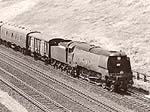| |
A
family holiday at New Milton, Hampshire, in 1956, enabled me to sample
the running on the Waterloo to Bournemouth line, together with the
Southampton to Salisbury and the Wimborne lines. I travelled down from
the Midlands via Bath and the Somerset and Dorset route. I purchased two
local "runabout"
tickets, which, together, gave me access to Weymouth and Salisbury in
the west, and Basingstoke and Portsmouth in the east. I spent 6 full
days on the railway, usually starting from either Brockenhurst or New Milton. I have divided my
journeys into
Main Line Workings, and Secondary Services. The latter will be covered
in a later edition, so here we are dealing principally with Waterloo to
Bournemouth and Weymouth services, plus inter regional services via
Basingstoke. |
|

